I’ve been reviewing Samsung flagship smartphones for the past couple of years, and even before reviewing the company’s top-tier devices, I covered the likes of the A series and some of the company’s other S series devices, including the Galaxy S20+. Each time I spent time with one of these handsets, I wasn’t excited to ditch my iPhone, as it never felt worth setting up a new phone that felt the same as its previous iteration.
Every year, Samsung’s flagships offer mostly minor updates that have never really grabbed my attention. With slightly more RAM, a higher resolution primary camera, a lower resolution selfie shooter, the same 5,000mAh battery and a practically identical display, the tech giant’s smartphones have been very iterative for years — at least until now.
Since going hands-on with the Galaxy S24 Ultra ahead of Samsung’s Unpacked event for the first time in years, I’ve been truly looking forward to reviewing the tech giant’s latest flagship.
I’ve always been a sucker for gimmicks, which is why handsets like the Galaxy Z Fold series, the HTC U11, the Pixel 4 XL and more have all thrilled me in the past thanks to their unique features. The Galaxy S24 series’ key new feature is artificial intelligence in the form of ‘Galaxy AI,’ which uses both onboard and cloud-based AI powered by Qualcomm’s Snapdragon 8 Gen 3 and Samsung’s Gauss Language and Gauss Image models, as well as third-party features like Google’s Circle to Search.
While I don’t consistently use all of the features under the Galaxy AI umbrella, it’s clear they’re more than just gimmicks.
Dynamic LTPO AMOLED 2X, 120Hz, HDR10+, 2600 nits (peak)
Dynamic LTPO AMOLED 2X, 120Hz, HDR10+, 2600 nits (peak)
6.7-inch, Super Retina XDR, OLED True Tone display, 2779 x 1290 pixels, HDR 10, Dolby Vision, 120Hz refresh rate
Qualcomm Snapdragon 8 Gen 3
Qualcomm Snapdragon 8 Gen 3
200-megapixel, f/1.7, 24mm (wide), 50-megapixel, (periscope telephoto), 10-megapixel, f/2.4, 70mm (telephoto)
50-megapixel, f/1.8, 24mm (wide), 10-megapixel, f/2.4, 70mm (telephoto), 12-megapixel, f/2.2, 13mm, 120˚ (ultrawide)
48-megapixel (f/1.78, OIS, wide angle) + 12-megapixel (f/2.8, OIS, telephoto 5x optical ) + 12-megapixel (f/2.2, OIS, ultra-wide angle)
12-megapixel, f/2.2, 26mm (wide)
12-megapixel, f/2.2, 26mm (wide)
Wi-Fi 802.11 a/b/g/n/ac/6e/7, tri-band, Wi-Fi Direct
Wi-Fi 802.11 a/b/g/n/ac/6e/7, tri-band, Wi-Fi Direct
Fingerprint (under display, ultrasonic), accelerometer, gyro, proximity, compass, barometer
Fingerprint (under display, ultrasonic), accelerometer, gyro, proximity, compass, barometer
Face ID, Three axis gyro, Accelerometer, Ambient light sensor, Barometer
Nano-SIM and eSIM or Dual SIM
Nano-SIM and eSIM or Dual SIM
Colours: Black Titanium, White Titanium, Blue Titanium, Natural Titanium
Dynamic LTPO AMOLED 2X, 120Hz, HDR10+, 2600 nits (peak)
Dynamic LTPO AMOLED 2X, 120Hz, HDR10+, 2600 nits (peak)
6.7-inch, Super Retina XDR, OLED True Tone display, 2779 x 1290 pixels, HDR 10, Dolby Vision, 120Hz refresh rate
Qualcomm Snapdragon 8 Gen 3
Qualcomm Snapdragon 8 Gen 3
200-megapixel, f/1.7, 24mm (wide), 50-megapixel, (periscope telephoto), 10-megapixel, f/2.4, 70mm (telephoto)
50-megapixel, f/1.8, 24mm (wide), 10-megapixel, f/2.4, 70mm (telephoto), 12-megapixel, f/2.2, 13mm, 120˚ (ultrawide)
48-megapixel (f/1.78, OIS, wide angle) + 12-megapixel (f/2.8, OIS, telephoto 5x optical ) + 12-megapixel (f/2.2, OIS, ultra-wide angle)
12-megapixel, f/2.2, 26mm (wide)
12-megapixel, f/2.2, 26mm (wide)
Wi-Fi 802.11 a/b/g/n/ac/6e/7, tri-band, Wi-Fi Direct
Wi-Fi 802.11 a/b/g/n/ac/6e/7, tri-band, Wi-Fi Direct
Fingerprint (under display, ultrasonic), accelerometer, gyro, proximity, compass, barometer
Fingerprint (under display, ultrasonic), accelerometer, gyro, proximity, compass, barometer
Face ID, Three axis gyro, Accelerometer, Ambient light sensor, Barometer
Nano-SIM and eSIM or Dual SIM
Nano-SIM and eSIM or Dual SIM
Colours: Black Titanium, White Titanium, Blue Titanium, Natural Titanium
Galaxy AI Umbrella
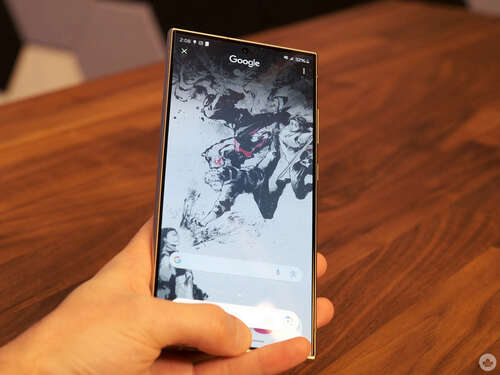
Let’s start with the headline feature, Galaxy AI. Galaxy AI isn’t just one feature but an umbrella term for features like ‘Circle to Search,’ Galaxy AI photo editing tools, Transcript and Note Assist, Live Translate, Interpreter mode and more.
During my time with the S24 Ultra, the Galaxy AI feature I’ve used the most is Circle to Search. It allows users to hold down the home button to prompt a Google Search overlay. From there, you can circle or tap an object on your display with your finger or the S Pen. I use Circle to Search all the time, especially regarding clothes. I love borrowing fashion influences from other people, and in 2024, one of my resolutions is to be more fashionable. Circle to Search has helped me find ideas for new outfits, especially while scrolling through Instagram.
I’ve shown off Circle to Search to several people and asked if it’s something they’d use, and most said they could see themselves taking advantage of it. Circle to Search is by far the most interesting of Samsung’s Galaxy AI features, and I’ve used it nearly every day during my time with the Galaxy S24 Ultra. It’s worth mentioning that Google’s Pixel 8 series will also get Circle to Search and that the feature isn’t exclusive to Samsung’s devices.
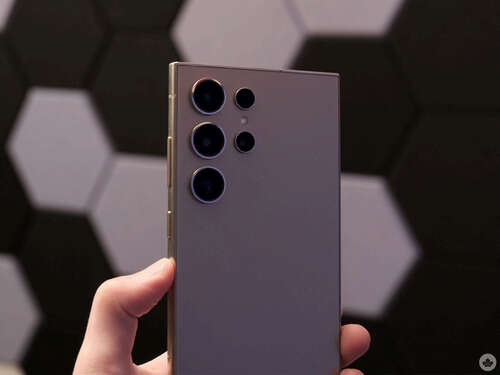
The second most-used AI feature is the ‘AI keyboard.’ When you start writing a message in any app with the Samsung Keyboard, you can change the text’s tone and check for writing and grammar. I think this tool has been pretty useful, though I haven’t used it as much as Circle to Search.
Another Galaxy AI feature I found useful was the AI photo editing tools, which make it easy to tweak photos. You can tap any photo in your Gallery app and tap the ‘i’ information button. After pressing the button, you’ll see suggestions of different editing options, such as remastering, removing reflections, removing shadows and more. I like this feature, and it seems to work better than the ‘Magic Editor’ on the Pixel 8 series. It offers a few more options. I could see the changes before applying them, and for the most part, they’re better. While it’s consistent, I would mess up occasionally, suggesting a removal of reflections or shadows when there aren’t any in the images. Instant Slow-mo is also fun to play around with, but I haven’t used it as much as the above AI features.
Situational AI
Some of the AI features within Galaxy AI are completely situational, so while I played around with them, I found I haven’t used them in my day-to-day life. These features include ‘Call Assist,’ ‘Interpreter,’ and ‘Live Translate.’ They all seem to work well but aren’t features most people will use every day. Also, while playing around with the Live Translate with my roommate, we learned that translation for certain languages isn’t perfect. We tried translation with the Taiwanese language, but according to my roommate, the translation was far from perfect.

I also haven’t used Note Assist or Transcript Assist all that much. However, I played around with Note Assist and can see how it’s useful and could work for me. Formatting seems mostly smart and I’m able to organize thoughts and make longer pieces of tech easier to understand by making bullet points and proper headers. Summarize works great and quickly shortens your thoughts.
My only gripe with Note Assist is that it has a character limit. I’m a journalist working on writing a novel, so I write a lot, and I found it easy to write too much for Note Assist to work. When that happened, I was forced to use Note Assist for partial chunks of my notes.
Samsung goes Titanium
That’s enough about AI – let’s get to the smartphone. Samsung’s Galaxy S24 Ultra offers Gorilla Glass on the front and back, but unlike previous Galaxy devices, it also features a titanium frame. The titanium frame is great and nicer than the iPhone 15 Pro’s titanium frame. It makes the handset feel more premium and slightly lighter than last year’s model. During my review process, I kept going back and forth between the Galaxy S23 Ultra and the S24 Ultra, and I couldn’t get over how much better it felt to hold the new handset. I haven’t used a case because I loved holding the device. However, it’s worth pointing out that the Galaxy S24 Ultra is a bit slippery, and I’ve managed to drop it a few times. Thankfully, the Galaxy S24 Ultra can endure a few hits with the titanium frame.
The smartphone also comes in ‘Titanium Black,’ ‘Titanium Violet,’ ‘Titanium Grey’ and ‘Titanium Yellow.’ If you purchase from Samsung directly, it’s also available in Titanium Blue, Titanium Green and Titanium Orange (my favourite is Titanium Yellow). My review unit is Titanium Grey, which I like a lot as it shows a uniform colour, but it’s not as nice as the Titanium Yellow.
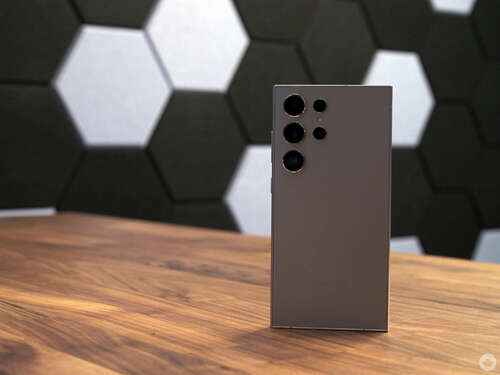
The Galaxy S24 Ultra features a 6.8-inch display with a 1440 x 3120 pixel resolution and an impressive 2600 units of brightness. Considering the brightness level, I’ve noticed that I haven’t had many issues while using the Galaxy S24 Ultra outside, but it’s worth noting that I live in Toronto, and it’s winter, so there hasn’t been a lot of sun. I’ve also noted that there haven’t been any issues with glare or problems with reflections. However, with overcast skies and cloudy, rainy days, I haven’t had many issues with the display outside in general.
As always, the UHD+ screen resolution makes pictures of watching videos and playing games look crisp and vibrant. When looking at a static page, the handset sports a 120Hz refresh rate that can dip as low as 1Hz. Like what I noticed last year, many handsets are starting to get 144Hz refresh rater displays, so it’s odd that Samsung hasn’t done this yet. It’s worth noting that it’s mostly gaming phones that achieve this higher refresh rate, but the Motorola Edge Pro has it, and if Motorola could do it, Samsung definitely can.
What’s going on with the camera?
The Samsung Galaxy S24 Ultra features cameras that are similar to the S23 Ultra’s. The biggest change is that the South Korean company has ditched the 10x zoom lens that has been available in the tech maker’s Ultra handsets since 2021. Instead, the S24 Ultra features a 50-megapixel sensor with a 5x zoom optical lens. This seems worse than previous handsets, but the camera pixel bins to a 12-megapixel shooter with a larger sensor that captures more light. Further, the camera can crop in, showcasing 10x zoom pictures at a 12-megapixel resolution. So, on paper, a 50-megapixel shooter with a 5x zoom should be better than the 10x zoom 10-megapixel camera on the S23 Ultra. However, in real-world testing, the results are mixed.
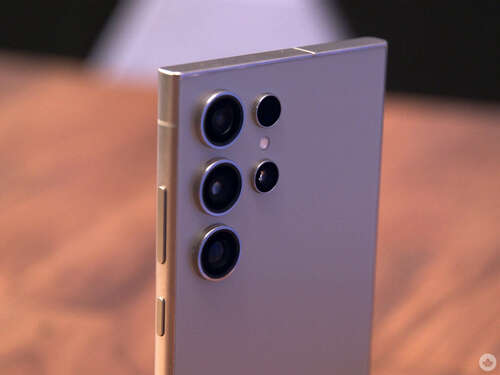
Other than the 50-megapixel 5x zoom camera, all the other shooters on the Galaxy S24 Ultra are the same as the S23 Ultra, including the 200-megapixel primary sensor, 10-megapixel 3x zoom camera and the 12-megapixel shooter with an ultrawide angle lens. So, you’d expect the S24 Ultra to take amazing pictures, but something is going wrong. While I can take some great shots with the S24 Ultra, the experience is inconsistent. Some of these images look overprocessed and offer fewer details than the same image taken with the S23 Ultra. It’s unclear why this is happening, although as the hardware is similar to its predecessor, this is likely due to software.
When the S24 Ultra camera performs well, images look great and are similar to its predecessor, showcasing good details, accurate colours, and high dynamic range. Even at 10x zoom, the pictures are similar, if not better, than the S23 Ultra’s with better lighting. But again, you’ll only be able to tell every once in a while. Lowlight images are stellar, showing off great colours and details. I shot some graffiti, and the image looked better on my handset than it did in real life. However, it’s worth noting that lowlight images are also inconsistent, and some turn out grainy and lack detail, depending on lighting conditions.
Nitty Gritty
Unlike last year’s model, the Galaxy S24 Ultra only comes in 12GB of RAM variants, which is great, as 8GB of RAM on an Android flagship in 2024 that you’re paying over $1,200 isn’t acceptable. As for storage, the handset starts at 256GB of storage and goes up to 1TB, like last year.
I’ve mostly played Marvel Snap since getting the device, and even after playing for half an hour, alongside checking e-mails, replying to messages on Instagram and more, the handset doesn’t seem to get warm.
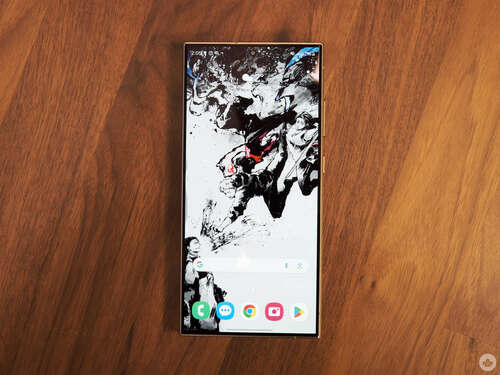
The battery is where the S24 Ultra shines. Even though it offers the same 5,000mAh battery that was available in the Galaxy S23 Ultra, I found that the phone could easily last a day. This includes watching a few YouTube videos, texting, scrolling through Instagram and more.
It’s worth noting that I also have the device showcasing its display in full UHD+ resolution, the brightness is set to automatic, the variable 120Hz refresh rate is on, and I barely have the Wi-Fi turned on and mostly use 5G data on Bell’s network, even when I’m home because my home Wi-Fi is trash in certain parts of the house.
Typically, I get the handset down to about 30 percent by the end of the day — some days, it’s slightly more but rarely less. The S24 Ultra then makes it through the night and can survive until the next morning and even in the afternoon, depending on when I wake up that morning. Since getting the device, the only time it’s died on me is when I first booted it up. It was downloading a ton of apps, and I was taking a lot of pictures. It reached about 8pm when I turned it on around 12:30-1pm.
While benchmarks don’t equate to how well your handset runs, with Geekbench 6, the Galaxy S24 Ultra has a single-core score of 2,206 and a multi-core score of 6,629. Even though I don’t put much weight into Geekbench scores, this is pretty impressive and surpasses the S23 Ultra; however, it loses to the iPhone 15 Pro and its A17 chip.

